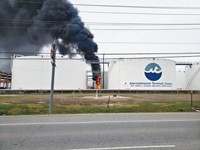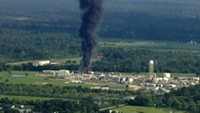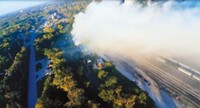Advertisement
Grab your lab coat. Let's get started
Welcome!
Welcome!
Create an account below to get 6 C&EN articles per month, receive newsletters and more - all free.
It seems this is your first time logging in online. Please enter the following information to continue.
As an ACS member you automatically get access to this site. All we need is few more details to create your reading experience.
Not you? Sign in with a different account.
Not you? Sign in with a different account.
ERROR 1
ERROR 1
ERROR 2
ERROR 2
ERROR 2
ERROR 2
ERROR 2
Password and Confirm password must match.
If you have an ACS member number, please enter it here so we can link this account to your membership. (optional)
ERROR 2
ACS values your privacy. By submitting your information, you are gaining access to C&EN and subscribing to our weekly newsletter. We use the information you provide to make your reading experience better, and we will never sell your data to third party members.
Industrial Safety
Chemical safety board releases report on Bio-Lab accident
Agency cites failed process safety management and poor weather preparation
by Jeff Johnson, special to C&EN
April 26, 2023
| A version of this story appeared in
Volume 101, Issue 14

Inadequate hurricane preparation and the failure to implement baseline process safety systems were among key shortcomings that led to a dangerous incident at a Louisiana chemical plant, according to a US Chemical Safety and Hazard Investigation Board (CSB) final report, released April 24.
The August 2020 incident at the Bio-Lab facility in Westlake, Louisiana, was driven by Hurricane Laura, a Category 4 storm that hit the Gulf Coast. The strong winds blew roofs off the facility, and plummeting rains interacted with the plant’s main product, trichloroisocyanuric acid (TCCA). More than 450 metric tons of TCCA were stored at the plant on the day of the incident.
TCCA is used as a sanitizer to kill algae and bacteria, predominantly in swimming pools and hot tubs, according to the CSB. In large bodies of water, TCCA is soluble and breaks down slowly, releasing chlorine and sanitizing contaminants. But when TCCA is moistened by small amounts of water and does not dissolve, it can experience a chemical reaction that generates toxic chlorine gas and explosive nitrogen trichloride.
Although no one was injured in the incident, fire and the chlorine release resulted in a shelter-in-place order for the nearby community. A freeway was closed for more than 28 h, and the facility was shut down for years. It was rebuilt at a cost of $250 million and reopened in 2022.
The CSB urges Bio-Lab to follow recent recommendations to harden chemical facilities in response to growing extreme weather incidents. It also urges improvements in emergency preparedness and response, noting that 5 h lapsed before there was an adequate response to control the event.
Also, TCCA, despite its reactivity, is not regulated as such by the US Occupational Safety and Health Administration and the Environmental Protection Agency under their risk and safety management programs for reactive chemicals. The CSB has for 2 decades urged the 2 agencies to broaden their regulatory schemes for reactive chemicals and include more chemicals, such as TCCA. Bio-Lab did adopt a partial voluntary scheme, but the CSB found it inadequate.
With the release of the Bio-Lab report, the CSB has 11 investigations pending. Its goal is to complete them all by the end of 2023.





Join the conversation
Contact the reporter
Submit a Letter to the Editor for publication
Engage with us on Twitter